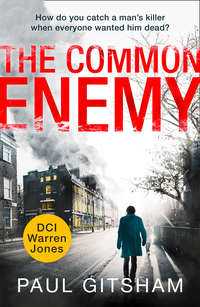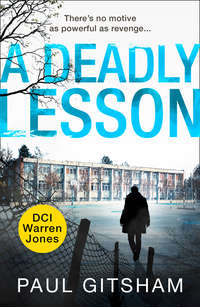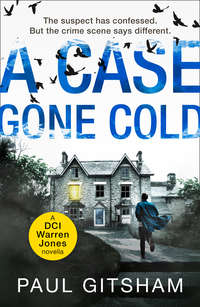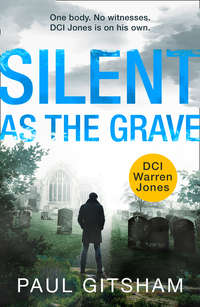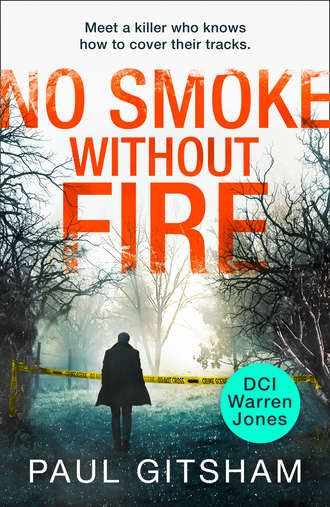
Полная версия
No Smoke Without Fire
Blackheath was shaking his head violently. He was gripping the edge of the table, and his knuckles had turned bone white. “No. Why would you say that? We loved each other.” His voice was strangled, whether with grief or anger Sutton couldn’t be sure. Regardless, he pressed on.
“We’re just brainstorming, son. It’s just that I can’t help asking myself what your response would be. I know that if I was in your position, I’d be pretty pissed off. Everything is finally rosy. All that shit about Bradshaw is in the past and the future is looking great. Then ‘wham!’ it all comes crashing down. She finds the ring — in your sock drawer, come on, lad! — and tells you it’s over, she can’t get married.” Sutton leant forward, his expression looking for all the world like a bad actor trying to look sympathetic towards someone he despised. “I bet she even did the whole ‘it’s not you, it’s me’ thing. Did she tell you that she’d always love you and you’d remain friends?” Sutton shook his head and looked at Warren. “I hate it when they do that, don’t you, sir?”
Warren nodded. “I wish they’d just be honest. I reckon it’s a way of feeling less guilty for treating you so badly.”
Sutton turned back. “Doesn’t make you feel any better though, does it? Makes you feel even more humiliated. And how do you tell your mates? Or the blokes at work? And what about your mum and dad? If she leaves you can you afford the rent on your own? It’s back to the granny flat with your tail between your legs. And what about the whispering? I’ll bet there’s a few crass enough to tell her it’s for the best and bring up the whole Kim Bradshaw thing. No wonder you were so angry.”
Blackheath was now crying. “No, never. It never happened like that. I know what you’re saying, that I was so angry about being dumped by Sally that I killed her. But I didn’t. I couldn’t do that to her. She never said anything about finding the ring. And even if she had, I’d never lay a finger on her. I love her too much.”
For the next few moments, the room was silent, save for Blackheath’s sobbing. Eventually, he wiped his eyes and sniffed loudly. “I’m not going to say another word without a lawyer.” He nodded towards the tape machine. “I was stupid to say anything without one.”
Warren shrugged. “No need for a lawyer. Like I said, you aren’t under arrest and are free to leave at any time. We have no more questions. Interview terminated at witness’ request.” Stating the time, he leant forward and turned off the tape recorder.
“Thank you for your time, Mr Blackheath. Would you like a lift back to work, or can we arrange for a cab to take you home?”
Blackheath could only look on with surprise. “I’ll walk,” he mumbled.
With that, Warren called the duty sergeant. Within a minute, the young man was out on the street, breathing in the icy December air.
* * *
Back in the interview room, Warren polled his fellow officers. “Thoughts?”
“I think he’s genuine. I rattled his cage good and hard but his story never changed. My gut tells me he didn’t do it.” Sutton shrugged apologetically as if sorry that he hadn’t been able to wring a confession out of the young man.
“I have to agree with DI Sutton, sir. He seemed genuine when we saw him yesterday and he hasn’t changed a single detail since then. I think he really did love her. I also think her father was wrong and that she was going to marry him.”
Warren agreed with both Sutton and Hardwick. “My gut feeling is exactly the same. But we can’t completely rule him out without eyewitness evidence or forensics—” he glanced at his watch “—which I am expecting any minute. Tell you what, why don’t you two go and have an early lunch? We’ll get the rest of the team together and have a meeting at one p.m.”
“Yes, sir,” both officers replied as Warren left the room.
Karen Hardwick turned to Sutton. “How do you do it, sir?”
Sutton knew what she was asking about. “You just have to put aside your feelings. It doesn’t matter if you feel sorry for them or not. Policing isn’t a popularity contest. Sometimes you have to be harsh and nasty, because it’s a harsh and nasty world.” He grimaced slightly. “Even if it does leave an unpleasant taste in your mouth.”
“Well, when we find the real killer, hopefully he’ll understand.”
Sutton shrugged. “Time will tell.”
Suddenly the door opened again and the desk sergeant poked his head around the door. “DCI Jones says don’t be late back from lunch. Blackheath’s off the hook and you’ve got a new suspect.”
Chapter 15
After a revelation like that, lunch was the last thing on Sutton’s and Hardwick’s minds and both raced upstairs to the CID main office. One p.m. was nearly an hour away and detectives by their very nature were insatiably curious; there was no way that the two officers were going to wait to find out what had been discovered. Unfortunately, the door to Warren’s office was closed. The DCI’s rules were very clear — if the door was open, they could knock and enter. If the door was closed, they shouldn’t knock unless it was an emergency. Sutton looked at Carol, Warren’s unofficial PA. She shrugged apologetically and pointed at the highly complex telephone unit that sat on her desk. “He’s in there with DC Hastings on a conference call.”
“Any idea who he’s talking to?” blurted Karen Hardwick, without thinking.
Carol pursed her lips in disapproval. “I’m sure that if DCI Jones wants you to know who he is talking to on his private line, he will tell you himself, Detective Constable.”
Hardwick blushed and stared at her shoes.
Sutton thanked Carol for her assistance and led the embarrassed constable away.
“OK, plan B. When Gary comes out of there and you two disappear off for lunch together, you find out what he’s got.”
Hardwick turned even redder. “What do you mean ‘disappear off for lunch together’?”
Sutton looked at her in amusement. “You’re working with a team of trained observers, Karen. How long did you two think you’d keep it quiet?”
Karen covered her face with her hands. “Oh, no. We were so careful, trying to be professional at work.”
Belatedly Sutton realised why she was so uncomfortable. “Don’t worry, lass. Nobody thinks otherwise. So long as you keep your private life at home, nobody cares.” He patted her awkwardly on the shoulder. “If anything, the guv thinks you make a sweet couple.”
Karen moaned as if in pain.
“I’m not really helping, am I?” asked Sutton.
“No, sir, not really.”
* * *
The briefing room was packed with team members, all eager to hear the latest developments. Warren called for quiet and the buzz of conversation settled down. Neither Karen nor Tony Sutton had managed to speak to DCI Jones or DC Hastings, so they were still in the dark about the new suspect.
Warren decided to address the question of Darren Blackheath first, handing over to Gary Hastings.
The DC shuffled the piece of paper in front of him. “I have the remaining results from the house-to-house inquiries conducted with Sally Evans’ neighbours. We’ve finally spoken to everyone on the estate. It’s the usual story: half the neighbours didn’t recognise her photo and most of the rest couldn’t remember what they were doing that evening. Those that knew the couple said that they seemed ‘nice enough’ and never had any bother. There was no evidence that there were any problems.
“The night she went missing, most couldn’t recall if Blackheath’s car had been present earlier in the evening, before her mother and Cheryl came around. However, we finally found one eyewitness who claims to be certain that he saw Blackheath’s car about six-thirty, before he went out to join his wife at the local bingo hall. I showed him a picture of the car and he said he recognised it immediately.” He gestured towards a picture of the car projected on the far wall. “Let’s face it, he’s hardly going to be mistaken.”
A polite titter went around the room. Darren Blackheath’s pride and joy was nothing if not distinctive. It had started life as a dark purple Vauxhall Astra. Its year of manufacture was unclear as the personalised number plate suggested the owner was a ‘Bad Boy’, rather than giving a registration date.
The vanity plate was the least personalised element of the car. The car’s tyres had been replaced with what appeared to be little more than black elastic bands wrapped around gold alloy disks. The suspension was lowered to make anything higher than a few centimetres a hazard to the fat, twin exhaust pipes that protruded from the rear, and graffiti-style electric-blue decals covered the vehicle, contrasting jarringly with the paint job. An unnecessarily large spoiler on the back made the whole thing look like a toy. The blacked-out windows, fluorescent-pink windscreen wipers and double bank of headlamps completed the whole garish ensemble.
“Thanks, Gary. Anything from Forensics?”
“No evidence of any foul play in either Blackheath’s car or their apartment. The car has been cleaned very thoroughly recently, which may have removed traces of mud, but that in itself isn’t suspicious. Blackheath is known to be obsessive about his car and he polished it most weekends. There is plenty of Sally Evans’ DNA inside the car and some fibres matching the coat she was wearing the night she was killed, but that is to be expected. She didn’t drive so Blackheath ferried her around a lot. However, there was none in the boot, or the back seat where you’d expect him to have forced her to sit.”
“He could have propped her up in the passenger seat. It was dark,” suggested Sutton, although he was clearly playing devil’s advocate.
Hastings shrugged. “Anything’s possible, I suppose.” He didn’t sound convinced.
“What about traffic and surveillance?” Warren asked, eager to move the conversation on.
“There are no surveillance or traffic cameras near the back alley where she was presumably abducted from. However, traffic cameras a couple of junctions away caught his licence number both just before six, when he should have been about to arrive and pick her up, and about fifteen minutes later when he claims to have left. We can’t tell what he did in that fifteen-minute window, but the timings are consistent with his version of events. Unfortunately, we have no other sightings of the car, so only the eyewitness report ties him to the apartment and rules out him driving her to the woods.”
Warren tapped a pencil thoughtfully. “So it seems that this witness, what CCTV we have and the forensics back up his story of what took place. I’d suggest that he’s no longer a suspect.” Heads nodded around the briefing table.
“OK, next up, where are we on Bill Evans’ alibi?”
DC Annabel Willis, a new probationary constable who had been assigned to follow up on that lead, spoke up. “Not much yet, I’m afraid. Travelodge have been very helpful. They confirm that his credit card was used in the Cambridge branch that evening. We’re looking at CCTV to see if we can piece together his comings and goings, but by their own admission it’d be easy enough to leave the hotel for a few hours without being picked up if you really wanted to.”
“What about this mysterious woman he claims to be having an affair with?”
This time it was DS Johnson who addressed the team. “Not a lot yet. As he suggested, her mobile phone is switched off. They aren’t due to meet up for another month — more if they skip the New Year weekend. We’re trying to trace ownership of her phone, but it doesn’t look helpful. We contacted the dating agency to see if she paid by credit card and to ask what records they have on the two of them, but they’ve insisted on a court order. However, the woman I spoke to hinted that they hold very little useful data. They might not even use credit cards, rather an Internet-based payment system that isn’t located in this country.”
“So verifying his alibi is going to be very difficult,” summarised Sutton.
“Well, keep at him. Something about him doesn’t quite ring true.” The two officers nodded their assent.
“With those two out of the way, perhaps we should turn our attention to new suspects. Gary, why don’t you take us through what you and DS Kent have found?”
Hastings removed the picture of Blackheath’s car from the screen.
“DS Kent and I have been putting all of the forensic and scene evidence into the HOLMES database to see what comes up. It’s been quite tricky as the most striking characteristic of this case has been the lack of evidence at the scene. Anyhow, we finally figured out the correct search terms to use, uploaded what information we had and we’ve started getting interesting results.”
He clicked on the screen.
“We have five potential hits. Rapes where very little forensic evidence was gathered and the CSIs speculate that the perpetrator went to great lengths to avoid leaving trace behind. In all five cases the victims followed a very set routine and were kidnapped, subdued with solvent, bound then taken to a secluded spot to be raped. They were then left and found by a member of the public. However, none of the five were killed. If it’s the same guy, either he’s changed his MO or Sally Evans’ death was an accident.
“Working backwards in time, the most recent was that of a jogger in June 2006 in Reading. The case was unsolved. Four years earlier a similar attack took place in Bristol — again the case is unsolved. We know these two cases are separate to the first three cases, because those were solved and the attacker was behind bars when the later two took place.”
“So we believe that the person responsible for the attacks in Bristol and Reading has struck again?” suggested Tony Sutton.
“Actually, we suspect not. The other three attacks took place in June, August and November of 1997.”
“It seems a long time between attacks. Why would he suddenly resurface?” asked Karen Hardwick.
“The attacker was convicted in May 1998 and sent down for eighteen years. The attacks occurred in and around the village of Stennfield, a couple of miles north of here.”
Tony Sutton, who had been at Middlesbury CID longer than anyone in the room, gasped audibly. “You’re kidding? You’re talking about Richard Cameron? That case was ongoing when I was a rookie DC. He got eighteen years back in 1998 — he’d be due parole pretty soon, I’d have thought.”
Hastings nodded. “Released on licence this time last year. Bloody big coincidence, don’t you think?”
Chapter 16
With the name of a potential suspect on the table a strategy was needed to bring the man in for questioning. Richard Cameron was a convicted serial rapist living on licence in a tiny village to the north of Middlesbury. Like all such ex-offenders he was required to report his current address to the police and maintain contact with a probation officer. Current police records on Cameron were sketchy and largely out of date, with interest in him minimal in the thirteen years since he’d been sent to prison. Prior to his release, the files had been updated with a more recent mugshot and details of his current whereabouts, but for the most part he was the responsibility of the probation service.
Sam Pargeter was a no-nonsense ex-submariner. A gruff, bullish Yorkshire man with a salt and pepper haircut, he was candid about why he’d joined the service as he helped himself to a cup of jet-black coffee from the CID urn.
“I got meself a reputation in the Navy as a bit of a hard bastard. Hard but fair. They stuck me in charge of whipping the less responsive boys into shape. Some of them see it all as a bit of a laugh when they’re training. ’Course, as soon as they come aboard a boat, and it finally dawns on them that they won’t even see daylight for the next six months, some of them start to play up. That’s where I came in.”
After loading his cup with several heaped spoons of sugar he followed the two detectives back to Warren’s office, where he continued his story.
“They called it ‘Pargeter’s detail’ and the kids were named ‘Pargies’. I don’t take bullshit from nobody, but I also don’t give it out. They stuck them with me for a week. For most of that week, they hated me — some of the names they called me when they thought I wasn’t listening would make your hair curl. Of course, by the end of the week, they thought the sun shone out of my arse. They realised that I was right and they was wrong — simple as. Some of them still write to me, letting me know about their latest promotions. Wouldn’t want to name names, of course, but there’s more than one flag officer who still sends me a Christmas card and a bottle of rum each year and calls himself a ‘Pargie’.
“Anyhow, eventually it was time to leave the service. A mate of mine asked if I fancied helping out in one of those places out in the sticks where they hide out-of-control teenagers. I did about twelve months there, but found it too depressing. Everybody’s just marking time until the kids turn sixteen, get turfed out then stab their way into an adult prison. Then I saw a programme one night about the National Offender Management Service. It talked about how their job was to stop reoffending — by any means necessary — and try and get some of these folks back into doing something useful in society.
“So I contacted them, went for an interview and here I am. They found out that I’m good with young lads and so I tend to specialise. A lot of these boys never really had a father figure, or if they did he was a drunk or an abuser. I keep an eye on them. If they don’t do what they’re told I’ll come around unannounced and smack ’em round the ear. If they’ve got a job interview and I’m free, I’ll turn up and hammer on the door until they get out of bed. I’ll even throw them in the shower and turn the water on them fully clothed if I have to.”
Pargeter shrugged and took a large swig of his coffee. “Some of them don’t like it and neither do some of the more liberal-minded folk in the office, but my re-offending rates are thirty to forty per cent lower than the average and I have a wall full of pictures from my former boys showing me what they’re up to now. Can’t argue with results like that.”
Warren eyed the man closely. Coming from most people, Sam Pargeter’s little speech would have sounded self-serving. Yet there was something about the way that he said it — calmly and matter-of-factly in a no-nonsense northern burr that seemed to invite trust in the man. Warren thought he could see why so many wayward youths responded to his methods.
Sutton also seemed impressed, or at least as impressed as he ever did. “So why did you end up with Richard Cameron? He hardly seems to fit your usual profile.”
“Well, ultimately, we have to deal with what comes our way. Cameron was released last year and I had space on my list, so I got him. He’s unusual and that’s why I’ve come to speak to you. Your call surprised the hell out of me.”
Warren glanced at Sutton.
“Why so surprised? Repeat offending in these cases is pretty high — we’ve all seen the stats.”
Pargeter nodded. “Normally I’d agree with you, Chief Inspector, but I thought Cameron was different.”
Warren’s face must have betrayed his scepticism.
“Look, Richard Cameron was sentenced to eighteen years for three rapes back in 1998. He did twelve years and was released on licence this time last year. When he entered the system he was a dangerous man, no question, with priors for drink-driving, domestic violence and petty theft. When the rapes occurred he lived with his wife, Angie, and teenage son, Michael, in a small farmstead about three miles north of Middlesbury, just outside the village of Stennfield. It isn’t much, a couple of acres of potatoes, a handful of pigs and a few chickens. He wasn’t a farmer by any stretch; he just inherited it from his old man, who inherited it from his old man et cetera.
“He basically left school at fifteen and drifted in and out of odd jobs before meeting Angie in about 1980. They had Michael in 1982. The farm was paid off by his father and he owns the land, so even when he didn’t have a job they always had a roof over their heads. Anyway, he wasn’t really on the radar as far as the police were concerned; he had a file, like I said, and Michael’s school raised warning flags with social services but nothing ever happened.
“And then the rapes occurred. You’re familiar with the details; suffice to say, it was luck as much as detective work that nailed him in the end. Michael was barely sixteen when Cameron was sentenced. The girls were all local and everyone knew who his dad was. In the end he finished his GCSEs, changed his name by deed poll to his mother’s maiden name and switched schools for sixth form. By all accounts the move was successful and he went on to get a decent set of A levels and go to university.
“Angie divorced Cameron and reclaimed her maiden name but stayed at the farm with Michael. Cameron apparently signed over the lease without much fuss. He told me when I first met him it was his first step in trying to repair the damage done to his family.”
Sutton looked pointedly at the clock on the wall; where was all this going? he wondered.
Warren tried to be a little more discreet. Pargeter got the hint. “The thing is, Cameron didn’t kill those three girls. He raped them, and beat them, but he isn’t a murderer. That was his downfall. One of the girls gave a description of the mask that he was wearing, which ultimately led to his arrest.”
“You said it yourself, that was his downfall; he left a witness behind. Maybe he’s learnt his lesson — dead bodies can’t testify in court.” Sutton’s tone was getting decidedly impatient; he knew that Det Supt Grayson would probably be appearing any moment with an arrest warrant, to be served should Cameron decline to attend the police station voluntarily.
Pargeter ignored Sutton’s tetchiness. “You’re right. I think he has learnt his lesson. When inside, he worked hard to complete the schooling he should have done thirty years earlier and became a lay preacher, and volunteer counsellor to other prisoners.”
Sutton was unable to resist a snort of derision. In his opinion, the fabled prison conversion, especially amongst dangerous sex offenders, was just that. Nevertheless, an outside observer sitting in on parole-board hearings could be forgiven for thinking that a spell in prison was the making of a man and that HM Prison Service was single-handedly doing more to arrest the decline in active church-going than any number of evangelical outreach programmes. All nonsense, of course. Prisoners had a lot of time to try and figure out what it was the parole board wanted to hear and would do their best to oblige them.
For the first time since arriving at Middlesbury’s little CID unit, Sam Pargeter showed the briefest flash of irritation. “Look, I’m not a bloody idiot. I’ve been in this game far too long to be fooled by the old ‘I’ve found Jesus’ defence; nevertheless, whether he truly has found God or it’s just enlightened self-interest, I don’t think Richard Cameron would do anything that could get him put back inside. He barely survived the place. He attempted suicide three times — and, I mean, really attempted it. He’s made it quite clear to me and anyone else that will listen that he’ll kill himself before he sets foot inside another prison.”
Sutton looked at Warren. “Better make certain everyone knows that, guv. Last thing we need is a bloody suicide or death-by-cop.”
Pargeter scowled. “I doubt it will come to that.” He settled back into his chair and struck a more reasonable tone. “Look, make the appropriate preparations, but I don’t think it’s him.”
Warren shrugged non-committally. “Well, let’s see if we can rule him out. I’m telling you this in the strictest confidence, you understand.” He locked eyes with Pargeter, who nodded briskly and professionally. “We believe that the victim was carried several hundred yards, possibly dead, almost certainly unconscious. We’ve found no evidence that there was more than one person involved. Do you think that Cameron is capable of carrying the body of a young woman of average build and weight that distance?”



